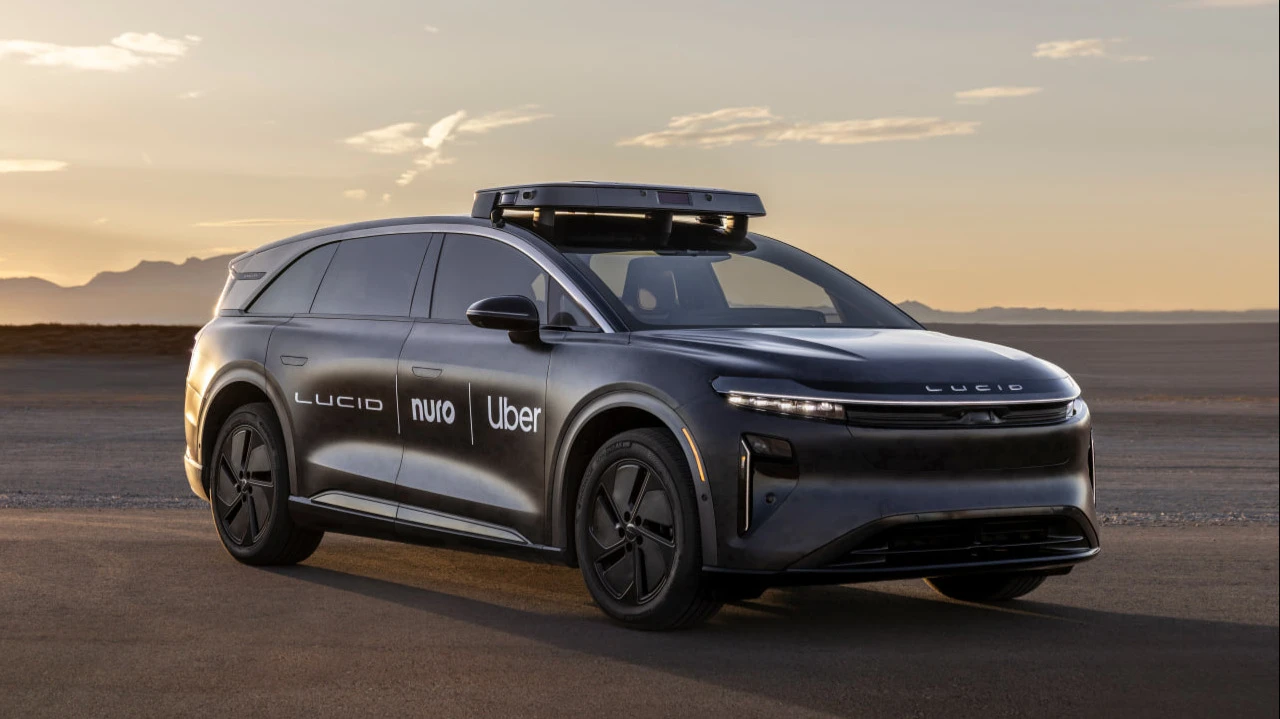Uber is bringing a Tesla competitor to the robotaxi market. Why is it important?
Cab service will purchase 20,000 Lucid electric vehicles to launch its own fleet of drones

Uber plans to strengthen itself in the highly competitive robotaxi market with a fleet of luxury electric cars from Lucid, equipped with fourth-generation drone systems from software developer Nuro. This adds to Uber's portfolio of contracts with a dozen other startups in autonomous transportation development, while major competitors Tesla and Waymo are looking to train their own AI to cut costs and not depend on contractors. Uber investors were not encouraged by the news, but Lucid shares soared.
Details
Uber plans to bring more than 20,000 Lucid Gravity luxury SUVs with its fourth-generation Nuro Driver system to the highly competitive robotaxi market in the U.S. over the next six years. The electric vehicles will be owned by the company or its fleet management partners. The service is scheduled to launch in 2026 in a major city, Uber did not specify where. The first unmanned Gravity is already being tested at the Nuro proving ground in Las Vegas, the companies said in a joint press release.
As part of the deal, which is expected to close in the third quarter, Uber will also acquire $300 million worth of Lucid common stock through its SMG Holding subsidiary. At current prices, this investment represents about 3.3% of Lucid's market capitalization. Uber will also invest "several hundred million dollars" in Nuro.
"Uber's investment confirms that our modular architecture and high-tech platform are a perfect fit for autonomous driving," noted interim Lucid CEO Marc Winterhoff. - This is just the beginning of our journey to enter a market valued at trillions of dollars."
How did the stock react
In trading on July 17, Uber shares lost 0.25%, falling to $90.5. They have been declining for seven consecutive sessions, while the company's value has increased by 50% since the beginning of the year.
Lucid stock soared 47% after the partnership announcement, but lost some of its gains by the close and remained up 35%.
Tesla shares were down 0.8% at the close of trading on July 17.
What kind of market is this
Tesla expanded testing of its robot cabs in Austin this week, and CEO Ilon Musk announced plans to begin testing in the San Francisco area. The company is trying to eliminate middlemen from the chain: it develops the AI itself, builds the datasets for it and trains it, and produces the cars itself.
Alphabet-owned startup Waymo, has advanced the furthest in introducing unmanned cabs: it has several fleets in the United States. The company also developed and trained the AI itself and assembled the unmanned system, but is installing it on Jaguar cars.
Uber behaves like a cab aggregator: it doesn't have its own fleet of unmanned cars, but it has contracts with various partners. In addition to Lucid and Nuro, these include unmanned systems and electric vehicle developers Pony AI, WeRide, May Mobility, Motional and Volkswagen. Uber also collaborates with Waymo in Austin and Atlanta.
Why Uber's investors didn't like the deal
Skeptics have noted that Uber's approach, in which it has neither its own AI nor an autonomous vehicle pipeline, could be a losing proposition. In a note to clients published after the announcement of the partnership with Lucid, Wedbush analyst Scott Devitt wrote that the deal "underscores Uber's weak position" in the race for leadership in autonomous transportation. "To us, this looks like an agreement in the spirit of the old days, when companies tried to protect themselves from Google's looming dominance by partnering with [weaker startups] AskJeeves, Overture or Infoseek," investor's Business Daily quoted Devitt as saying. - Meanwhile, Tesla and Waymo continue to build out their AI infrastructure as well as train their AIs."
Dewitt said buying electric cars and investing in both Lucid and Nuro would undermine the capital discipline often cited by optimists on Uber stock. He pointed to the execution risks associated with Lucid: the company has only delivered about 10,000 vehicles in 2024, and he said it will likely need to raise additional capital to meet the volumes requested by the cab service.
Wall Street analysts are rather positive appreciate Uber's participation in the unmanned car market and don't see the company threatened by competition,
wrote Barron's in early June. In the long run, the unmanned car market could grow so much that all of its participants - Uber, Tesla and Waymo - could benefit, the publication estimated at the time. In the long run, the unmanned car market could grow so much that all of its participants - Uber, Tesla and Waymo - could benefit, the publication said at the time. In the long run, the unmanned car market could grow so much that all of its participants - Uber, Tesla and Waymo - could benefit from it;
What this means for Lucid
The partnership was an "unexpected catalyst" for the luxury electric car maker, Baird analyst Ben Kallo told MarketWatch. He said the deal will strengthen Lucid's financial position by bringing in a new investor and increase brand awareness. Kallo also noted that the partnership with Uber could be expanded or lead to new agreements with other players.
Like Devitt, he did not rule out that Lucid would have to raise additional capital in the process. Perhaps, as before, through debt and equity offerings.
The electric car maker's goal of selling 20,000 Air sedans and Gravity SUVs in 2025 looks ambitious, but orders from Uber could bring the company significantly closer to that goal, provided Lucid can scale production, notes Yahoo Finance.
This article was AI-translated and verified by a human editor
